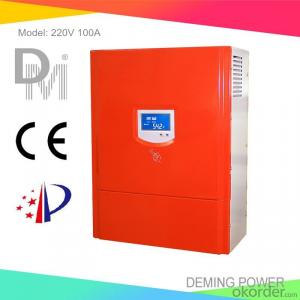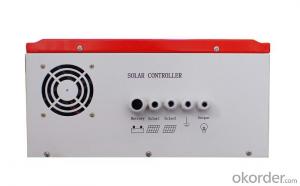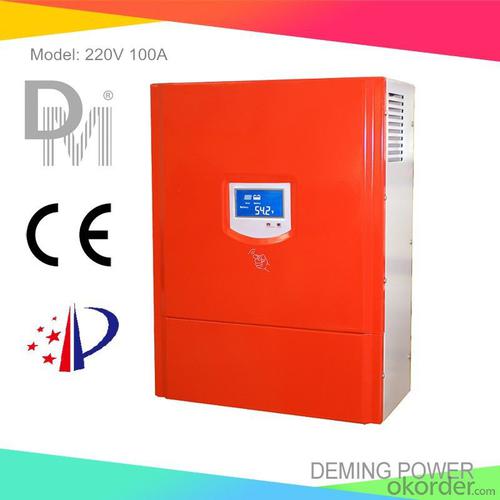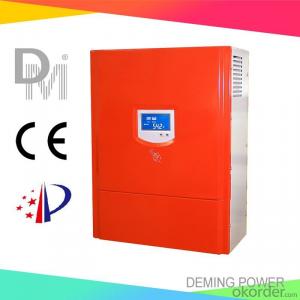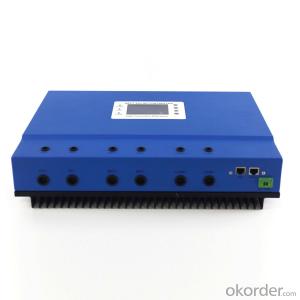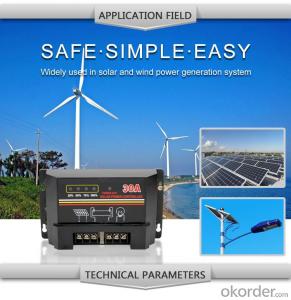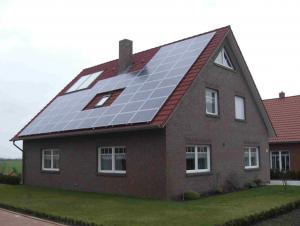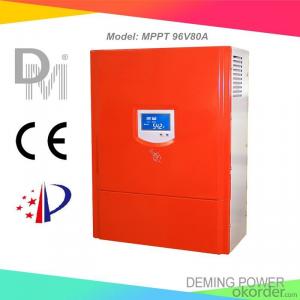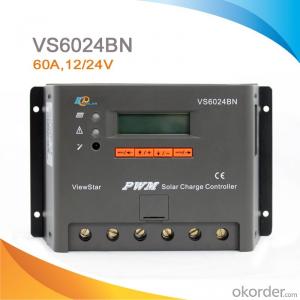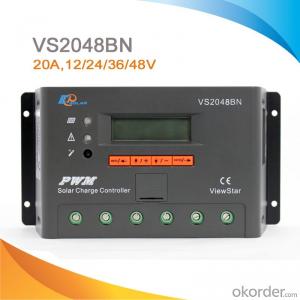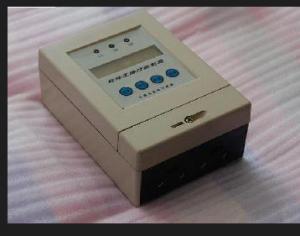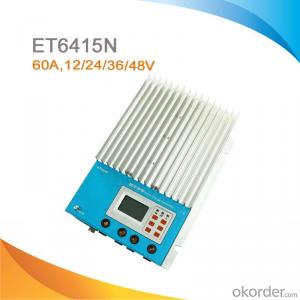Mastervolt Solar Charge Controller 220V 100A - Best Price for Solar Power System
- Loading Port:
- Qingdao
- Payment Terms:
- TT OR LC
- Min Order Qty:
- 1 PCS
- Supply Capability:
- 500 PCS/month
OKorder Service Pledge
OKorder Financial Service
You Might Also Like
Properties of the solar charge controller
1. Design for off-grid solar power system.
2. Applicable to different kinds of batteries.
3. Modular design with simple structure and easy maintenance.
4. Automatic power control function.
5. LCD display: Solar panel current, solar panel voltage, solar panel power, battery group voltage, charge current.
6. Perfect protection function: Solar reverse charge protection, Solar reverse connection protection, Battery reverse connection protection, Battery overcharge protection, Battery over current protection etc ,thus the system has higher reliability.
Technical parameters of the solar charge controller
Model | 220V100A |
Battery group rated voltage | 220Vdc |
PV open circuit voltage(Vdc) | 500V |
PV Rated current | 100A |
PV Max. power | 22000Wp |
Input DC Voltage Range(Vdc) | 175-260Vdc |
Input PV module road number | 2 |
Function | Auto stop charge, auto recharge voltage; Protection: connecting contrary, over current, short circuit, over heat etc. |
Display mode | LCD |
Display content | solar panel voltage, solar panel current, solar panel power, battery voltage, charge current |
Floating Charge Voltage (adjustable) | 248Vdc |
Stop charge voltage | 260Vdc |
Recharge voltage | 243Vdc |
Voltage drop between PV and battery | 1.5V |
Max itself power consumption | 100mA-150mA |
Work environment temperature | -30-60°C |
Relative humidity | <90% No condensation |
Applicable altitude | <3000m The rated power should be reduced when it is higher than 2000m |
Noise (1m) | <40dB |
Degree of protection | IP20(Indoor) |
Cooling method | Forced air cooling |
*Communication interface (optional) | RS485/USB/GPRS/Ethernet |
*Temperature compensation(optional) | -4mv/°C/2V,-35°C~+80°C,Accuracy:±1°C |
Package size (mm) | Wood case, 750*380*590mm |
Package Weight(kg) | 36Kg |
*Above parameter only for reference. Could be custom made to user specifications.
- Q: Do solar controllers require any maintenance?
- Yes, solar controllers require regular maintenance. This typically includes cleaning the controller's surface, checking and tightening any loose connections, inspecting the wiring and cables for any damage, and ensuring proper ventilation for efficient operation. Additionally, it is recommended to monitor the controller's performance and battery health regularly to ensure optimal functionality and longevity.
- Q: What is the role of a solar controller in preventing damage to the solar panels from fire hazards?
- The role of a solar controller in preventing damage to solar panels from fire hazards is primarily to monitor and regulate the electrical flow between the solar panels and the battery system. Solar controllers, also known as charge controllers or solar regulators, are essential components of a solar power system. Their main function is to regulate the voltage and current coming from the solar panels to prevent overcharging and damage to the battery bank. In terms of fire hazards, solar controllers play a crucial role in preventing damage by ensuring that the panels do not produce excessive amounts of electricity. Overcharging a battery can lead to the release of hydrogen gas, which is highly flammable and can cause fires or explosions. Solar controllers prevent this by monitoring the battery voltage and adjusting the charging current accordingly. They have built-in safety features such as temperature sensors and voltage cut-off mechanisms that help prevent potential fire risks. If the battery becomes fully charged or reaches a certain temperature threshold, the solar controller will automatically reduce or cut off the charging current to prevent overcharging and potential fire hazards. Additionally, some advanced solar controllers come with additional safety features such as short-circuit protection, reverse current protection, and over-discharge protection. These features help protect the solar panels from damage caused by electrical faults or abnormal conditions that could potentially result in fires. Overall, the role of a solar controller in preventing damage to solar panels from fire hazards is to regulate the flow of electricity, prevent overcharging or excessive discharge of the battery, and ensure the safe operation of the entire solar power system. By effectively managing the electrical flow, solar controllers significantly reduce the risk of fire hazards and help ensure the longevity and safety of the solar panels.
- Q: Can a solar controller be used with solar panels that have shading issues?
- Solar panels that are affected by shading issues can still be used with a solar controller. This device is responsible for regulating the flow of electricity from the solar panels to either the battery or the grid. Its main purpose is to optimize the performance and efficiency of the solar system by managing the voltage and current. When solar panels are exposed to shading problems, such as trees or nearby buildings obstructing sunlight, the overall output of the panels can be greatly reduced. This can result in decreased energy production and efficiency of the solar system. However, the impact of shading on the solar panels can be mitigated with the help of a solar controller. It typically employs an algorithm called Maximum Power Point Tracking (MPPT) to continuously monitor the output of the panels and make necessary adjustments to the voltage and current in order to maximize power production. This technology enables the solar panels to operate closer to their maximum power output even under partially shaded conditions. By utilizing a solar controller, the system can still generate a significant amount of electricity despite the shading issues. It ensures that the solar panels are functioning at their optimal performance levels, thereby maximizing energy production and system efficiency.
- Q: Can a solar controller increase the efficiency of a solar panel?
- A solar panel's efficiency can be increased with the help of a solar controller. Also known as a charge controller, a solar controller is a vital component in solar power systems. Its main purpose is to regulate the flow of electricity between the solar panel and the battery bank. One of the primary functions of a solar controller is to safeguard the batteries from overcharging or over-discharging. By monitoring the voltage and current levels, it ensures that the batteries are charged optimally and not subjected to excessive voltage or discharged below safe levels. This prevents energy wastage and extends the lifespan of the batteries, indirectly enhancing the overall efficiency of the system. Furthermore, advanced solar controllers often incorporate Maximum Power Point Tracking (MPPT) technology. These controllers utilize algorithms to continuously track and adjust the electrical load on the solar panel, enabling the extraction of maximum power output irrespective of temperature or shading conditions. Consequently, the solar panel can operate at its highest efficiency, even in less-than-ideal circumstances, resulting in increased energy production. To summarize, a solar controller plays a critical role in optimizing the performance of a solar panel system by preventing battery damage and maximizing power output. By regulating and optimizing the charging process, it can significantly enhance the efficiency of a solar panel.
- Q: Can a solar controller be used with a solar-powered wireless communication system?
- A solar-powered wireless communication system can certainly utilize a solar controller. The role of a solar controller is to regulate the power output from solar panels, ensuring effective battery charging and safeguarding against overcharging. In the context of a solar-powered wireless communication system, the solar controller plays a vital role in power supply management for communication devices. By linking the solar panels to the solar controller, the charging process can be optimized through voltage and current adjustments tailored to the battery's requirements. This optimization enhances solar panel efficiency and guarantees proper battery charging. Furthermore, a solar controller offers essential safety features, such as preventing battery or communication system damage caused by overcharging. It also safeguards against reverse current flow, which may occur during low sunlight periods or at night when solar panels are inactive. In summary, a solar controller is an indispensable element for any solar-powered system, including wireless communication systems. It facilitates efficient power management, extends battery lifespan, and ensures reliable communication in remote or off-grid locations.
- Q: Can a solar controller be used for both off-grid and grid-tied systems?
- No, a solar controller cannot be used for both off-grid and grid-tied systems. Off-grid systems require a solar controller to regulate the charge of batteries, whereas grid-tied systems do not require battery storage and therefore do not need a solar controller for this purpose. The functionalities and requirements of solar controllers vary depending on the specific system type.
- Q: Are solar controllers necessary for small solar systems?
- Yes, solar controllers are necessary for small solar systems. Solar controllers regulate the charging and discharging of batteries in the system, preventing overcharging and damage to the batteries. They also help optimize the efficiency and performance of the solar system by managing the flow of electricity. Therefore, even for small solar systems, solar controllers play a crucial role in maintaining the longevity and effectiveness of the system.
- Q: What are the advantages of using a PWM solar controller?
- The advantages of using a PWM (Pulse Width Modulation) solar controller are numerous. Firstly, PWM controllers are more affordable compared to other types of solar controllers. They are simpler in design and require fewer components, making them cost-effective for smaller solar systems. Secondly, PWM controllers are highly efficient in converting solar energy into usable electricity. They can effectively regulate the charging process and maintain the battery at optimal levels, ensuring maximum power transfer and extending battery lifespan. Additionally, PWM controllers are known for their durability and reliability. They are designed to withstand harsh outdoor conditions, such as extreme temperatures and humidity, making them suitable for various environmental settings. Moreover, PWM controllers provide better protection for the battery bank. They have built-in features like overcharging, over-discharging, and short-circuit protection, preventing any potential damage to the batteries and ensuring their longevity. Lastly, PWM controllers are user-friendly and easy to install. They typically have clear and intuitive interfaces, allowing users to monitor and adjust system settings effortlessly. Overall, the advantages of using a PWM solar controller include affordability, efficiency, durability, battery protection, and user-friendliness, making them a popular choice for small to medium-sized solar power systems.
- Q: Can a solar controller be used with a solar-powered charging station for electronic devices?
- Yes, a solar controller can be used with a solar-powered charging station for electronic devices. The solar controller regulates the voltage and current from the solar panels to ensure efficient and safe charging of the electronic devices. It helps optimize the charging process and protect the devices from overcharging or any voltage fluctuations.
- Q: Can a solar controller be used with solar panels of different manufacturers?
- Yes, a solar controller can be used with solar panels of different manufacturers as long as they have compatible specifications and voltage ratings. However, it is important to ensure that the controller is able to handle the combined power output of the panels and adjust its settings accordingly.
Send your message to us
Mastervolt Solar Charge Controller 220V 100A - Best Price for Solar Power System
- Loading Port:
- Qingdao
- Payment Terms:
- TT OR LC
- Min Order Qty:
- 1 PCS
- Supply Capability:
- 500 PCS/month
OKorder Service Pledge
OKorder Financial Service
Similar products
Hot products
Hot Searches
Related keywords
